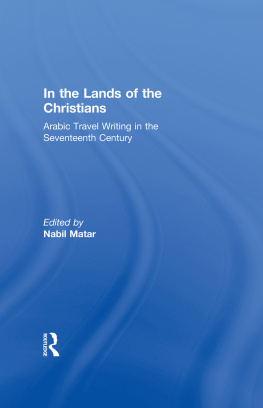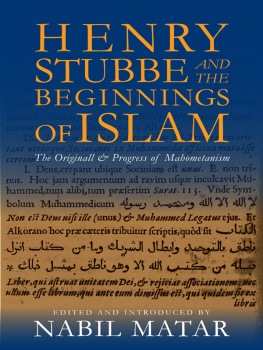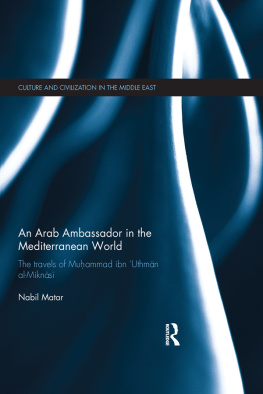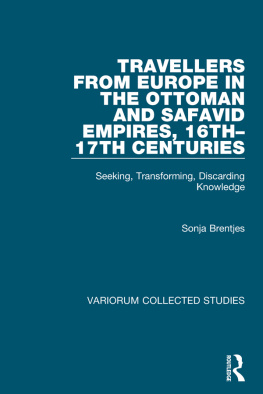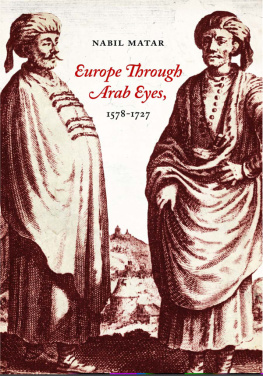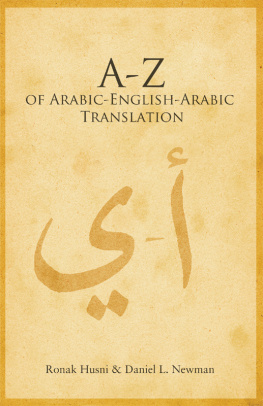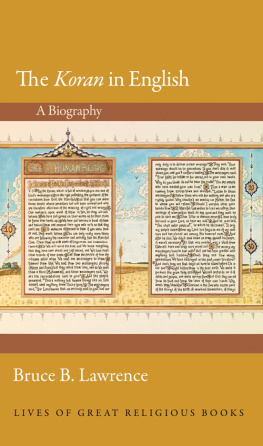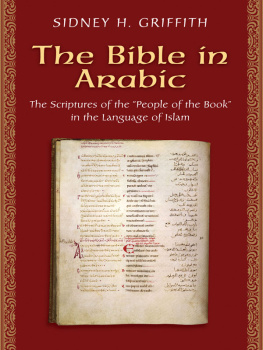In the Lands of the
Christians
In the Lands of the
Christians
ARABIC TRAVEL WRITING IN THE
SEVENTEENTH CENTURY
EDITED AND TRANSLATED BY
NABIL MATAR
ROUTLEDGE
New York and London
Published in 2003 by
Routledge
711 Third Avenue,
New York, NY 10017
Published in Great Britain by
Routledge
2 Park Square, Milton Park,
Abingdon, Oxon, OX14 4RN
Copyright 2003 by Taylor & Francis Books, Inc.
Routledge is an imprint of the Taylor & Francis Group
All rights reserved. No part of this book may be reprinted or reproduced or utilized in any form or by any electronic, mechanical, or other means, now known or hereafter invented, including photocopying and recording or in any information storage or retrieval system, without permission in writing from the publishers.
10 9 8 7 6 5 4 3 2 1
Library of Congress Cataloging-in-Publication Data
In the lands of the Christians: Arabic travel writing in the seventeenth century / edited and translated by Nabil Matar.
p. cm.
Includes bibliographical references (p. )
ISBN 0-415-93227-0 (alk. paper)ISBN 0-415-93228-9 (pbk: alk. paper) 1. Travelers writings, ArabicEarly works to 1800. 2. ArabsTravelEarly works to 1800. I. Matar, N. I. (Nabil I.), 1949
G227.I5 2002
910'.88927dc21
2002069885
In Memoriam
Salim Kemal (19471999)
Unforgotten traveler
Contents
|
INTRODUCTION
Arab Travelers and Early Modern Europeans
|
THE TEXTS
A Note on Translation and Selection
|
1 | FRANCE AND HOLLAND
Selections from Kitab Nasir al-Din ala al-Qawm al-Kafirin
(The Book of the Protector of Religion against the Unbelievers)
Ahmad bin Qasim [al-Hajari], 1611-1613
|
2 | EUROPE AND SOUTH AMERICA
Kitab Siyahat al-Khoury Ilyas bin al-Qissees Hanna al-Mawsuli
(The Book of the Travels of the Priest Ilyas, Son of the Cleric
Hanna al-Mawsuli)
Ilyas Hanna al-Mawsuli, 1668-1683
|
3 | SPAIN
Rihlat al-Wazir fi Iftikak al-Asir
(The Journey of the Minister to Ransom the Captive)
Mohammad bin abd al-Wahab al-Ghassani, 1690-1691
|
4 | FRANCE
Letters
Abdallah bin Aisha, 1699-1700
|
|
I AM GRATEFUL to many people who made this project possible, but foremost is Marilyn Goravitch, for her tireless dedication and unwavering commitment at the Humanities and Communication Department of the Florida Institute of Technology. Marilyn has been of great help to me in locating references, finalizing the text for publication, and compiling the index. To her, and to the other secretaries, Sue Downing (who was especially helpful in locating biblical references) and Suanne Powell, I am deeply thankful. I also wish to thank, as always, Victoria Smith and Linda Khan of the Evans Library at Florida Tech; and Anne Mercante and Laura Baade for their linguistic assistance.
Dr. Jane Patrick, former Humanities and Communication Department head at Florida Tech, was kind enough to read the initial proposal; and Dr. Mohja Kahf made some valuable comments and corrections, for which I am grateful. Thanks are also due to Yolanda Corey for responding to all my queries about South and Central American history, and to Marcia Denius, who proofread part of the text. I also wish to thank Drs. Muhammad Shaheen and Muhammad Asfour of Jordan University and Sharjah University respectively for their generous hospitality in Amman, Jordan and for sharing with me their vast knowledge of Islamic history and Arabic literature. I am very grateful to Dr. Khalid Bekkaoui of Sidi Mohammed University in Morocco for his close reading of the introduction and his helpful comments and insights. I also want to thank Dr. Anouar Majid of the University of New England for helping me with many of the Moroccan references and for always sending encouraging notes. And of course, in the final stages, there was G. Y.
I am grateful to the dean of the College of Science and Liberal Arts at Florida Tech, Dr. Gordon Nelson, who always encourages research; and to Dr. Andrew Revay, vice president for academic affairs (now in joyous retirement), who supported both my participation in the conference at the Temimi Foundation in Zaghouan, Tunisia (March 2025, 2001) and my research at the National Library of Tunis. I am grateful to the librarians there for their kindness, and to Dr. Mohamed Habib El Hila for providing me with the proper library introduction and for clarifying some bibliographical entries.
I will be ever thankful to Dr. Abdeljelil Temimi for inviting me to the conference on Great Britain and the Maghreb: the State of Research and Cultural Contacts at his quasi-monastic and stunningly evocative Fondation in Zaghouan. The five days of intensive presentations and discussions were invaluable to me. I also wish to thank Mohamed-Salah al-Omari of Exeter University for coordinating the conference and overseeing it to perfection. Dr. Khalid b. Srhir was extremely generous in sharing with me his vast knowledge of Moroccan and North African history. Many other scholars who attended the conference also have been of help. To all of them, I am deeply grateful.
Parts of the introduction were presented at different national conferences: the University of Arkansas, Fayettville, invited presentation at the King Fahd Center for Middle East and Islamic Studies (February 10, 2001); South-Central Renaissance Conference, College Station, Texas (April 47, 2001); and the annual conference of the Modern Language Association, New Orleans (December 2629, 2001). To all the respondents in these conferences, especially to Dr. Donald Dickson and Dr. Vincent Cornell, I am deeply grateful.
This book is dedicated to a man who was the most powerful inspiration in my lifea man who was a traveler in the lands of Christians and indeed, in the whole lands of mankind: Salim Kemal.
Although we both went to Cambridge University at the same time, we did not meet until I was introduced to him, the new faculty member in the philosophy department, in Nicely Hall at the American University in Beirut in 1981. Salim proved a fiery teacher: hami (hot) was the word that students used about a man who brilliantly awakened their curiosity in the midst of the cruelty of war. He was disarming and approachable, and possessed a gentle smile, but behind it was a mind that was devastatingly sharp. Once Salim got started, he was relentless, logical, unperturbed, unstoppable. Many members of faculty disliked that quality in him, but I knew how much he was driven by a brutal quest for truth, a Socratic devotion to ideas. During the Israeli siege of Beirut in the summer of 1982, we used to meet, alone among the remnants of the university, in the lower floor of Nicely, safe (or at least so we hoped) from the naval and aerial horrors that were visited upon us. We huddled under the stairwell, having brought coffee with us, and it was in those afternoons that I encountered the full range of his fearless curiosity. In those terrifying hours, he taught me about Walter Benjamin and Theodor Adorno, Abu Al-Nasr al-Farabi and Abu Ali al-Hussain Ibn Abdallah Ibn Sina, David Hume and Immanuel Kant, and in those hours began a friendship that will never end.
To Salim I owe my initiation into the fascinating world of translation. I had never thought of doing any translation until he suggested that I work on al-Farabis treatise of poetry. I did, and discovered in the process the excitement of words.
Salim Kemal died of a heart attack on a grim Friday night, November 19, 1999, leaving behind him ground breaking publications on European and Islamic philosophy. He also left behind a deeply saddened wife and children, Jane, Sarah, and Rahim in Dundee, Scotland; aging parents in India; and his brother, Fahim, in London. May you rest in peace, dear friend, and unforgotten traveler.

